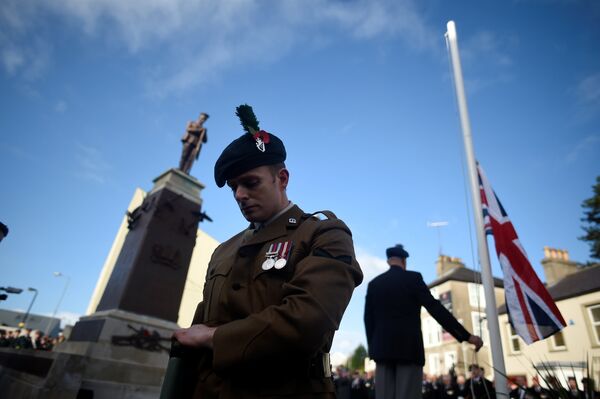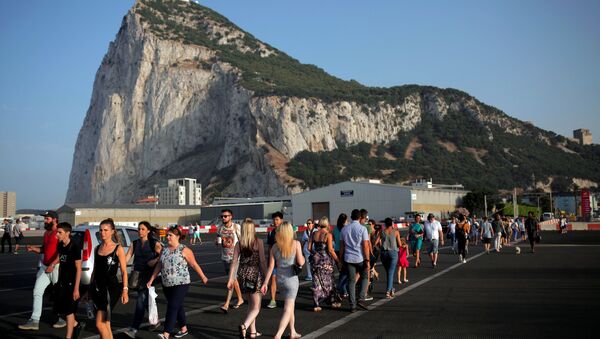On March 6, 1988 three members of an "active service unit" of the Provisional IRA were shot dead in Gibraltar, a British colony and military outpost in southern Spain.
Daniel McCann, Sean Savage and Mairead Farrell were thought to be plotting a car bomb attack on a British military band which conducted a weekly ceremony outside the Governor General's residence.
It later emerged the trio were unarmed and not in possession of a viable bomb when they were gunned down by commandos from the Special Air Service (SAS).
Remembering Irish freedom fighters Mairéad Farrell, Seán Savage & Daniel McCann who were shot dead by the cowardly SAS 30 years ago today in Gibraltar. The Brits launched a massive cover-up, witnesses were intimidated & the British media did their usual job of vilifying. pic.twitter.com/elESNaCezk
— Crimes of Britain (@crimesofbrits) March 6, 2018
Daesh Threat Very Different From IRA
The terrorist threat in Europe has changed out of all recognition since that day as a result of the emergence of Islamist terrorists, or jihadis, who were happy to die during suicide bombings or other violent attacks against civilian targets.
But Christian Kaunert, a Professor of Policing and Security at the University of South Wales, said the rules of engagement had not actually changed for most police forces or armies in Europe.
"Legally speaking, there is no shoot-to-kill policy. It's a shoot to incapacitate policy," Dr. Kaunert told Sputnik.
He said if the police or army had a "credible belief" that someone was going to detonate a suicide bomb they were legally entitled to kill that person.
30 years ago today, the brave men of the SAS eliminated 3 terrorist scum in Gibraltar. #GodBlessTheSAS🇬🇧 pic.twitter.com/LNCHTgzABK
— ᴵᵐᵖᵉʳⁱᵃˡ ᴮᵉᵃʳˢ (@imperialbears) March 6, 2018
"The legal framework is still there and it has not changed. The use of force has to be proportionate to the threat. But obviously the threat has changed so the proportionate response has changed. When you are dealing with suicide bombers the proportionate response will be different," Dr. Kaunert told Sputnik.
"It would be against the European Convention on Human Rights for any government to use a shoot-to-kill policy, that is why the killing of the IRA suspects in Gibraltar was so controversial. Under the European convention everyone has a right to life," Dr. Kaunert told Sputnik.
IRA Families Took Case to European Court
The dead IRA members' families took the case to the European Court of Human Rights which, in 1995 found the British government had violated Article 2 of the Convention but it said the trio had been engaged in an act of terrorism and their families were not therefore entitled to damages.
Dr. Kaunert said public opinion had shifted in recent years as the threat from al-Qaeda and Daesh sympathizers has grown and the targets have become civilian, rather than the military ones targeted by the IRA and the Basque separatists ETA in the 1980s and 90s.
"Public opinion goes up and down depending on events but in the last two years we have seen significant terror threats and the public are more accepting," Dr. Kaunert told Sputnik.
Memories of Mairéad Farrell on the 30th Anniversary of the Gibraltar Ambush – by her comrade Breige Anne McCaughley – Saoradh Nuachthttps://t.co/RfTiQwHdE3 pic.twitter.com/LXTNtp2kj5
— Saoradh (@EireSaoradh) March 5, 2018
He said there was certainly little sympathy for Khalid Masood, who was shot dead by police after mowing down civilians in a car on Westminster Bridge and stabbed to death a police officer guarding Parliament.
But he said few people in Europe wanted to see a situation such as was seen in the Philippines recently when police officers were allegedly granted permission by President Rodrigo Duterte to wipe out criminal elements on the streets.
'Police Are Not There to Punish'
"The police are not there to punish suspects. It's for a court to determine what is the adequate punishment," Dr. Kaunert told Sputnik.
The then Prime Minister, Margaret Thatcher, denied the SAS had used a "shoot-to-kill" policy but there were suspicions she had ordered them to take out the IRA team in revenge for the killing of 12 people in a bombing at a Remembrance Sunday service in Enniskillen five months earlier.
The official version was that the SAS team could not be sure if the IRA gang had managed to get explosives into Gibraltar and feared they would detonate a bomb.
As they tailed the trio a police car drove by with its siren on, spooking the IRA members.
All Three Suspected of Reaching for Guns
One of the SAS troopers claimed he saw McCann make a move across the front of his jacket and thought he was reaching for a gun or for a remote detonator. He said he had no time to shout the usual warning and shot McCann dead.
Farrell, who allegedly reached for her bag, was also gunned down and Savage too was shot down after reportedly moving his hand towards his jacket.
Britain claimed the SAS used minimum force. Shooting Mairead 5 times, Daniel 4, Sean 16. They were all shot atleast twice in the head & suffered multiple bodily injuries. Sean suffered 29 separate injuries. Britain unleashed a relentless campaign to scare witnessess in Gibraltar
— Breo-saighead (@DedamacsinsBrat) March 6, 2018
But all three had been unarmed so they were certainly not reaching for weapons in their jackets or bags.
The SAS troopers were in plain clothes but they put on berets and armbands to identify themselves before the local Gibraltar police arrived.

Although the IRA gang had no weapons and no bomb, the Guardia Civil later found explosives at an apartment they were renting near Malaga.
The funeral of Farrell, Savage and McCann turned into a huge news story after loyalist gunman Michael Stone attacked mourners in Belfast's Milltown cemetery.
The views and opinions expressed by Christian Kaunert in this article are those of the speaker and do not necessarily reflect those of Sputnik.


